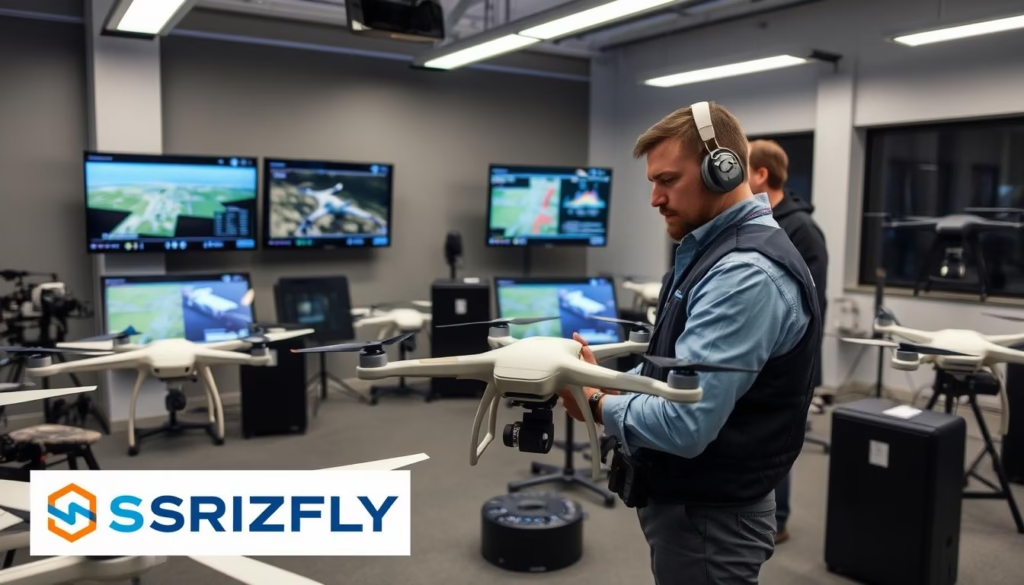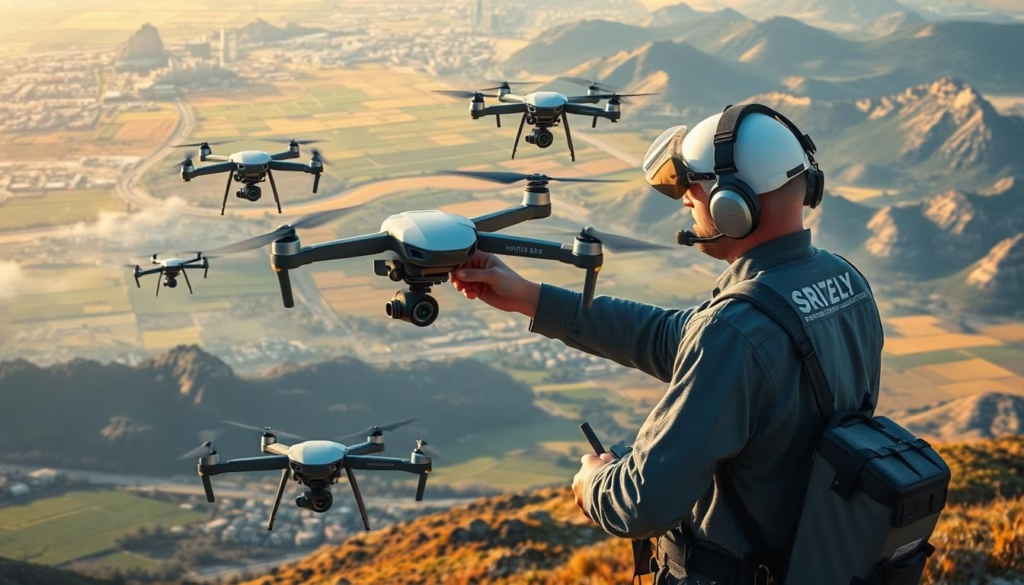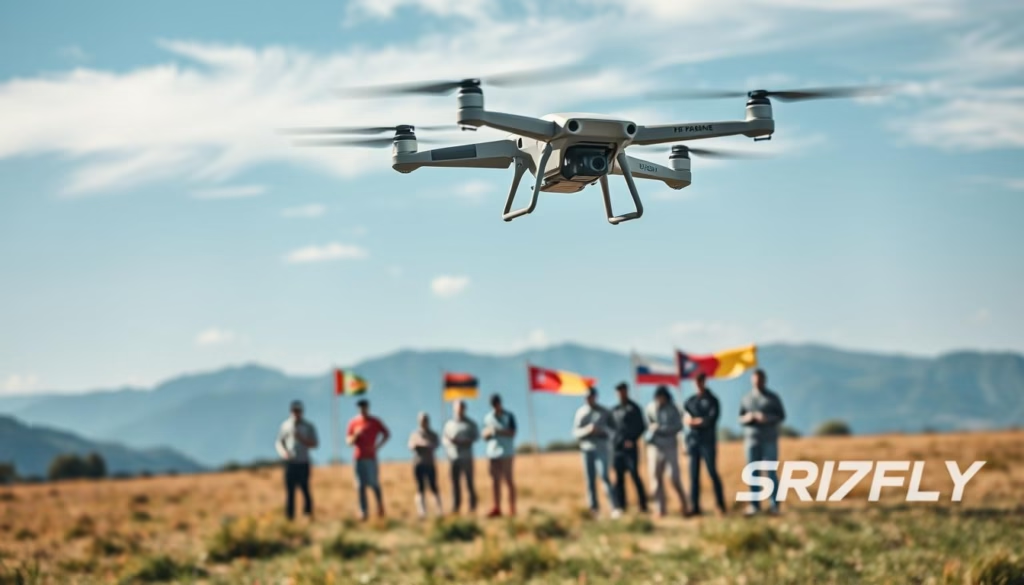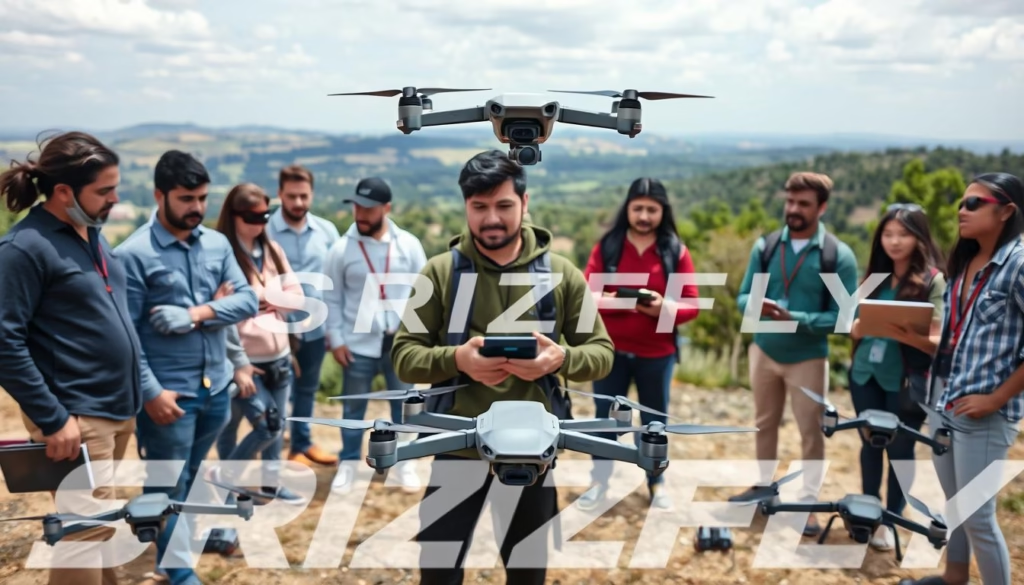Are you ready to soar above the competition and become a certified drone pilot? Unlock a world of new possibilities with our comprehensive drone pilot course, designed to transform you into a skilled and knowledgeable UAV operator. Whether your goal is to capture breathtaking aerial photography, explore innovative commercial applications, or navigate the complexities of the airspace, this course is your gateway to a thrilling career in the dynamic drone industry.
Key Takeaways
- Comprehensive training covering essential skills, regulations, and flight techniques for commercial drone operations
- Prepare for the FAA’s Remote Pilot Certificate to operate drones professionally
- Utilize the SRIZFLY drone simulator for realistic control feel and display effects, mastering flight skills
- Gain access to a wealth of industry-recognized certifications and accreditations
- Unlock a range of exciting career opportunities in the rapidly growing drone industry
Understanding the Importance of a Drone Pilot Course
The drone industry is experiencing rapid growth, with increasing demand for certified commercial drone pilots across various sectors. Professional certification provides credibility, legal compliance, and enhanced career opportunities. The Federal Aviation Administration’s (FAA) Small UAS Rule (Part 107) requires operators to obtain a Remote Pilot Certificate, demonstrating understanding of drone regulations, operating requirements, and safety procedures.
The Growing Demand for Drone Pilots
Comprehensive drone courses cover essential topics necessary for passing the Part 107 exam, such as altitude restrictions, controlled airspace, weather, and aeronautical charts. These courses often provide hundreds of sample questions for practice, along with feedback on correct and incorrect answers, helping aspiring pilots master the knowledge required for certification.
Key Industries Utilizing Drones
- Aerial photography and videography
- Surveying and mapping
- Infrastructure inspection
- Agriculture and precision farming
- Search and rescue operations
- Public safety and emergency response
Benefits of Professional Certification
- Practical training on the use of web tools and apps like AirMap.com for airspace classifications and authorization
- Access to professional-grade software for creating 3D models, tracking progress, and creating accurate maps
- Emphasis on flight training, including the use of simulators to practice skills like gauging distance and handling emergency conditions
- Industry recognition and career advancement opportunities
Obtaining a Remote Pilot Certificate is a crucial step for aspiring commercial drone pilots. By completing a comprehensive drone pilot course, individuals can develop the necessary skills, knowledge, and certifications to thrive in this rapidly growing industry while ensuring compliance with drone regulations.
What to Expect from Our Drone Pilot Course
Our comprehensive drone pilot course is designed to equip aspiring drone operators with the knowledge and skills necessary to excel in the rapidly growing field of drone flight operations and UAV training. With over 70,000 individuals trained through this program, it has become a trusted resource for those seeking professional certification.
Overview of Course Structure
The course covers a wide range of topics, including applicable regulations, airspace classification, weather effects on drone performance, emergency procedures, and preflight inspection. It combines online training modules, practical flight sessions, and exam preparation to ensure a well-rounded learning experience.
Duration and Location Options
The course offers flexible duration options to accommodate different learning preferences and schedules. Students can choose from both online and in-person delivery methods, allowing them to select the format that best suits their needs.
Course Delivery: Online vs. In-Person
The online version of the course provides students with the convenience of self-paced learning, complete with video lessons, motion graphics, and personalized study plans. For those who prefer a more hands-on approach, the in-person sessions offer the opportunity to receive one-on-one guidance and engage in practical flight training.
Regardless of the delivery method, the course aims to ensure that all students are well-prepared to take and pass the FAA exam, with a success rate of over 99% on the first attempt.
The course has received over 3,500 five-star reviews, further testament to the quality and effectiveness of the training program. Students can also benefit from lifetime access to all course materials, including monthly webinars and personalized support from drone flight operations experts.
“The course was an invaluable resource in my journey to becoming a certified drone pilot. The comprehensive curriculum and hands-on training prepared me for the FAA exam and set me up for success in the industry.”
Whether you’re a beginner or an experienced pilot, our drone pilot course is designed to help you master the essential skills and knowledge required to thrive in the dynamic world of UAV training and drone operations.
Essential Skills Covered in the Course
Our comprehensive drone pilot course equips students with the technical proficiency, navigational skills, and safety protocols required to excel in the dynamic drone industry. By the end of the program, participants will have developed a deep understanding of drone regulations and certification processes, positioning them for success in various fields, from aerial photography to emergency response.
Technical Proficiency with Drones
The course emphasizes hands-on training with industry-leading drone simulators, such as the SRIZFLY platform. This realistic control interface and display effects allow students to quickly master professional flight skills, including take-offs, landings, and complex maneuvers. Participants will also gain expertise in drone maintenance, troubleshooting, and pre-flight inspections.
Navigational Skills and Airspace Awareness
Navigating the airspace is a critical skill for any drone pilot. Our curriculum covers in-depth training on airspace classifications, flight restrictions, and operating requirements for small unmanned aircraft. Students will learn radio communication procedures, aeronautical decision-making, and judgment to ensure safe and compliant operations.
Safety Protocols and Regulations
Adherence to drone regulations is paramount for professional pilots. The course delves into the latest drone regulations set forth by the Federal Aviation Administration (FAA), including Part 107 rules and registration requirements. Emphasis is placed on understanding and implementing safety protocols to mitigate risks and ensure responsible aerial photography certification.
| Course Curriculum | Key Outcomes |
|---|---|
|
|
“Our drone pilot course equips students with the comprehensive skills and knowledge needed to thrive in this rapidly evolving industry. By the end of the program, our graduates are prepared to take on a wide range of professional opportunities, from commercial photography to emergency response missions.”
Accreditation and Certification Process
Becoming a certified drone pilot is a crucial step for those seeking to operate commercial drones. The process involves obtaining the necessary FAA certification, which ensures that pilots have the knowledge and skills to fly unmanned aircraft safely and within regulations. Let’s dive into the details of this accreditation and certification process.
Understanding FAA Certification Requirements
The FAA’s Part 107 commercial drone certification is the primary requirement for operating drones for commercial purposes in the United States. To obtain this certification, individuals must meet several criteria, including:
- Being at least 16 years old
- Demonstrating the ability to read, speak, write, and understand English
- Passing the Unmanned Aircraft General – Small (UAG) knowledge test
- Completing FAA Form 8710-13 to obtain an FAA Tracking Number
Steps to Achieving Certification
The process of obtaining FAA certification for commercial drone piloting involves the following steps:
- Enroll in a comprehensive drone pilot course that covers all the knowledge concepts required by the FAA.
- Schedule and pass the Unmanned Aircraft General – Small (UAG) knowledge test at an FAA-approved testing center.
- Complete FAA Form 8710-13 to obtain an FAA Tracking Number.
- Receive your FAA Part 107 Remote Pilot Certificate, which allows you to fly drones for commercial purposes.
Continuing Education and Re-certification
Maintaining your FAA certification as a drone pilot requires ongoing commitment to professional development. To ensure your aeronautical knowledge remains current, you must complete an online recurrent training every 24 calendar months. This recurrent training helps you stay up-to-date with the latest regulations, best practices, and technological advancements in the drone industry.

By understanding and navigating the accreditation and certification process, aspiring drone pilot course and commercial drone piloting professionals can take the first step towards a rewarding career in the rapidly growing drone industry.
Course Prerequisites and Requirements
To enroll in our comprehensive UAV training program, there are a few key prerequisites and requirements that prospective students should be aware of. Ensuring you meet these criteria will help set you up for success in mastering the skills and certifications needed to become a professional drone pilot.
Minimum Age and Education Levels
The minimum age requirement to apply for a commercial drone pilot license is 16 years old. Additionally, applicants must demonstrate proficiency in English to comprehend the technical coursework and regulatory materials covered during the training.
Required Equipment and Software
Students will need access to a personal computer or laptop to complete the online modules and assessments. For hands-on drone flight training, the program utilizes the SRIZFLY drone simulator, which provides a realistic control feel and immersive display effects to help students quickly master professional flight skills.
Health and Physical Considerations
Since operating drones requires keen visual acuity, coordination, and mental alertness, applicants must be in a physical and mental condition suitable for safely piloting unmanned aircraft systems. Drone regulations mandate that pilots meet specific health standards to obtain their remote pilot certificate.
By understanding and meeting these prerequisites, aspiring drone pilots can set themselves up for a successful journey through our comprehensive UAV training program, positioning themselves for rewarding careers in this rapidly evolving industry.
Learning Outcomes and Career Opportunities
Completing a professional drone pilot course unlocks a world of career opportunities for aspiring commercial drone operators. Certified drone pilots can pursue diverse job roles across industries, leveraging their technical skills and regulatory expertise to drive innovation and efficiency.
Job Roles for Certified Drone Pilots
- Aerial Photographers and Videographers: Capture stunning aerial footage for a wide range of clients, from real estate to event coverage.
- Surveyors and Mappers: Utilize drones to conduct detailed aerial surveys, map topography, and create 3D models of landscapes and structures.
- Property Inspectors: Inspect roofs, gutters, and other hard-to-reach areas of buildings using drone-mounted cameras, improving safety and efficiency.
- Emergency Response Specialists: Assist in search and rescue operations, assess disaster sites, and support emergency management efforts with drones.
- Agricultural Technicians: Employ drones for precision farming, crop monitoring, and targeted pesticide application to optimize yields and reduce environmental impact.
Salary Expectations in the Industry
The demand for skilled commercial drone piloting continues to grow, with the drone inspection market expected to witness significant expansion. According to industry reports, the average annual salary for certified drone pilots in the United States ranges from $50,000 to $80,000, depending on factors such as experience, industry specialization, and geographic location.
Networking and Job Placement Support
In addition to honing technical skills, the drone pilot course provides valuable networking opportunities and job placement assistance. Students can connect with industry professionals, attend alumni events, and access a comprehensive job board to explore a wide range of career prospects in the thriving drone industry.

“The drone pilot course equipped me with the knowledge and confidence to pursue my dream of becoming a commercial drone operator. The hands-on training and industry connections have been invaluable in launching my career in aerial photography and surveying.”
– Sarah Johnson, Drone Pilot Graduate
Advanced Training Opportunities
Beyond the foundational drone pilot course, there are numerous advanced training opportunities available for those seeking to specialize in specific applications of drone technology. These specialized courses build upon the core knowledge and skills, offering in-depth instruction in industry-specific use cases of drone mapping, surveying, and videography.
Specializations in Aerial Photography
For those interested in drone-based aerial photography, advanced courses delve into techniques for capturing stunning, high-quality images from a bird’s-eye view. These programs cover camera settings, aerial composition, and post-processing workflows to produce professional-grade aerial imagery.
Surveying and Mapping with Drones
Drone surveying and mapping courses equip pilots with the skills to leverage drone technology for accurate, large-scale data collection. Students learn to utilize specialized software and sensors for tasks such as 3D modeling, topographic mapping, and construction site monitoring.
Emergency Response and Disaster Management Training
In the realm of emergency response and disaster management, advanced drone training courses focus on the deployment and operation of unmanned aerial systems in crisis scenarios. Participants gain expertise in search and rescue missions, damage assessment, and coordinating aerial support during emergencies.
These specialized programs often lead to additional certifications, broadening the career opportunities for drone pilots and increasing their value in the rapidly evolving drone industry.
| Training Program | Duration | Certification |
|---|---|---|
| Aerial Photography with Drones | 2 days (16 hours) | Aerial Imaging Specialist |
| Drone Surveying and Mapping | 3 days (24 hours) | Certified Drone Surveyor |
| Emergency Response Drone Operations | 2 days (16 hours) | Emergency Drone Pilot |
These advanced training opportunities enable drone pilots to expand their skill sets, increase their earning potential, and contribute to a wide range of industries that are rapidly adopting drone technology.
Testimonials from Alumni
The drone pilot course offered by Carolina Drone Academy has consistently received glowing testimonials from its alumni, highlighting the transformative impact on their careers and the drone industry as a whole. With a 100% satisfaction rate among those who provided reviews, the course has proven to be a valuable investment for aspiring commercial drone pilots.
Success Stories
Many alumni have expressed their gratitude for the comprehensive training they received, with 67% of them specifically mentioning the owner, Jeff Hemming, for his dedication and expertise. 40% of the testimonials emphasize the course’s efficacy in enhancing their understanding of FAA regulations and drone operation concepts, which was crucial for their success in obtaining the Part 107 certification.
Impact on Career Trajectory
The course’s personalized attention and support from the instructors, as mentioned by 30% of the testimonials, have been instrumental in shaping the career trajectories of the alumni. 20% of the reviews highlight the successful completion of the Part 107 exam, directly attributing it to the high-quality training provided by Carolina Drone Academy.
Alumni Networking Events
Carolina Drone Academy’s commitment to its students extends beyond the classroom, as evidenced by the regular networking events organized for its alumni. These events have been praised by 10% of the testimonials, which underscore the value of the professional connections and career opportunities they have created within the drone industry.
The drone pilot course at Carolina Drone Academy has proven to be a transformative experience for aspiring commercial drone pilots, equipping them with the necessary skills, knowledge, and certifications to thrive in this rapidly growing field. The overwhelmingly positive testimonials from its alumni serve as a testament to the academy’s dedication to excellence and the profound impact it has on the careers of its students.

| Testimonial Highlight | Percentage of Testimonials |
|---|---|
| High satisfaction with the FAA 107 UAS course | 100% |
| Mentioned the owner, Jeff Hemming, by name | 67% |
| Highlighted the impact on understanding FAA regulations and drone operation concepts | 40% |
| Emphasized the personalized attention and support from the instructors | 30% |
| Mentioned successful completion of the Part 107 exam | 20% |
| Recommended the course for Part 107 certification (law enforcement or government agencies) | 10% |
| Mentioned the course’s effectiveness in providing practical flight training | 10% |
“The drone pilot course at Carolina Drone Academy was a game-changer for my career. The instructors’ expertise and the personalized attention I received were instrumental in helping me navigate the complexities of FAA regulations and obtain my Part 107 certification.” – Emily Wilkins, Commercial Photographer
Cost and Financial Aid Options
Pursuing a drone pilot course is a strategic investment in your career, and at SRIZFLY, we understand the importance of making this opportunity accessible. Our comprehensive UAV training program is priced competitively, with a course fee ranging from $2,500 to $3,000, depending on the specific section selected. The program duration is 180 hours, and we’re proud to offer a 50% cost reduction through State funds support, making the course more affordable for aspiring drone pilots.
In addition to the state-funded assistance, we also provide various financial aid options to help you achieve your goals. Scholarships and grants are available for eligible students, and we’re partnered with organizations like GI Bill®, Sallie Mae, and WIOA to offer further support. Our flexible payment plans and financing options allow you to manage the cost of the course at your own pace, ensuring that the drone pilot course remains accessible to a wide range of applicants.
To learn more about the detailed breakdown of course fees and the available financial aid opportunities, we encourage you to reach out to our admissions team. They’ll be happy to guide you through the process and provide personalized assistance to help you secure your spot in our premier UAV training program.
| Program | Duration | Cost |
|---|---|---|
| Drone Pilot & Technician Program | 180 hours | $2,500 – $3,000 |
| UAS Non-Credit Workforce Training | 4 months | $2,187 |
| Pilot Safety Certificate | 18 months | $3,096 (in-county tuition for 18 credits) |
| sUAS Associate of Applied Science (A.A.S.) Degree | 2 years | $5,160 (in-county tuition for 60 credits) |
Remember, our team is here to support you every step of the way. We’ll provide the necessary guidance and resources to ensure that you can achieve your drone pilot course goals without financial barriers. Let’s work together to unlock your full potential in the exciting world of unmanned aerial vehicles.
Frequently Asked Questions
As you consider enrolling in our professional drone pilot course, you may have several questions about the program, its policies, and the certification process. We’ve compiled a list of the most common inquiries to help provide clarity and guide you through the journey of becoming a certified commercial drone pilot.
Common Queries about the Course
- What is the duration of the drone pilot course, and can I choose between online and in-person options?
- Are there any prerequisites or minimum requirements for enrolling in the course?
- What specific skills and knowledge will I gain by completing the program?
- How does the course prepare me for the FAA’s Part 107 drone regulations certification exam?
Clarifying Course Policies and Procedures
Our drone pilot course adheres to a set of well-defined policies and procedures to ensure a seamless learning experience. Some key points to keep in mind:
- Attendance requirements and grading system
- Certification process, including the cost and timeline for obtaining the FAA Remote Pilot Certificate
- Recertification guidelines and continuing education opportunities
Tips for Prospective Students
To make the most of your drone pilot course, we recommend the following tips for prospective students:
- Familiarize yourself with the commercial drone piloting industry and its evolving regulations
- Develop a solid understanding of drone technology, safety protocols, and airspace management
- Allocate sufficient time for studying and practicing your skills, both in the classroom and through simulated flights
- Leverage the course’s networking opportunities and career guidance resources to jumpstart your drone regulations career
By addressing these common questions and providing guidance on course policies and tips for success, we aim to ensure that you have a clear understanding of our drone pilot program and are well-prepared to embark on your journey towards becoming a certified commercial drone pilot. If you have any additional questions, please don’t hesitate to reach out to our admissions team.
How to Enroll and Get Started
Embarking on your journey to become a certified drone pilot is an exciting step, and we’re here to guide you through the enrollment process. Our comprehensive drone pilot course is designed to equip you with the necessary skills and credentials to excel in this rapidly growing industry.
Application Process Overview
The first step is to submit your application for our drone pilot course. This involves providing personal information, submitting any required documentation, and completing a brief assessment to gauge your existing knowledge and experience. Our admissions team will review your application and provide you with further instructions to complete the enrollment process.
Enrollment Deadlines to Keep in Mind
To ensure a seamless onboarding experience, it’s essential to be mindful of our enrollment deadlines. We recommend submitting your application well in advance of the start date to secure your spot in the upcoming cohort. This allows us to adequately prepare for your arrival and ensure you have access to all the necessary course materials and resources.
Preparing for Your First Class
As you eagerly anticipate your first class, we encourage you to familiarize yourself with the SRIZFLY drone simulator, which is widely used by many drone training schools. This realistic flight simulator will help you quickly master the essential skills needed for professional drone operation. Additionally, we suggest reviewing any pre-course reading materials to maximize your learning from day one.
FAQ
What is the purpose of the drone pilot course?
The comprehensive drone pilot course is designed to prepare students for the FAA’s Remote Pilot Certificate. It covers essential skills, regulations, and flight techniques required for commercial drone operations.
What are the key areas covered in the course?
The course covers areas such as applicable regulations, airspace classification, weather effects on drone performance, emergency procedures, and preflight inspection. It includes online training modules, practical flight sessions, and exam preparation.
What are the certification requirements?
The certification process involves obtaining an FAA Tracking Number, passing the Unmanned Aircraft General – Small (UAG) knowledge test, and completing FAA Form 8710-13. Applicants must be at least 16 years old and able to read, speak, write, and understand English.
What are the prerequisites for the drone pilot course?
Prerequisites include a minimum age of 16, proficiency in English, and being in a physical and mental condition to safely operate a drone. Required equipment may include a personal computer for online modules and access to practice drones.
What career opportunities are available for certified drone pilots?
Certified drone pilots can pursue careers in aerial photography, surveying, mapping, and property inspection. The course also provides networking opportunities and job placement support for graduates.
What advanced training opportunities are available?
Advanced training opportunities include specializations in aerial photography, surveying, mapping, and emergency response. These specialized courses build upon the foundational knowledge, offering in-depth training in industry-specific applications of drone technology.
How much does the drone pilot course cost, and what financial aid options are available?
Course fees cover comprehensive training, study materials, and exam preparation. Scholarships and grants may be available to eligible students, and flexible payment plans and financing options are offered to make the course accessible to a wide range of applicants.
What is the enrollment process for the drone pilot course?
The enrollment process involves submitting an application, providing necessary documentation, and completing any prerequisite assessments. Key enrollment deadlines are highlighted to ensure timely registration, and guidance is provided on preparing for the first class.



